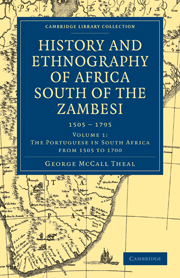Book contents
- Frontmatter
- PREFACE
- Contents
- MAPS AND PLATES
- CHAPTER I THE BUSHMEN
- CHAPTER II THE HOTTENTOTS
- CHAPTER III THE BANTU
- CHAPTER IV DESCRIPTION OF THE BANTU—(continued)
- CHAPTER V DESCRIPTION OF THE BANTU—(continued)
- CHAPTER VI SPECIMENS OF BANTU FOLKLORE
- CHAPTER VII DESCRIPTION OF THE BANTU—(continued)
- CHAPTER VIII ARAB AND PERSIAN SETTLEMENTS IN SOUTH-EASTERN AFRICA
- CHAPTER IX DISCOVERY OF AN OCEAN ROUTE TO INDIA
- CHAPTER X SUCCEEDING VOYAGES AND CONQUESTS
- CHAPTER XI OCCUPATION OF SOFALA AND MOZAMBIQUE
- CHAPTER XII INTERCOURSE OF THE PORTUGUESE WITH THE BANTU
- CHAPTER XIII DISASTROUS EXPEDITIONS UNDER BARRETO AND HOMEM
- CHAPTER XIV EVENTS TO THE CLOSE OF THE SIXTEENTH CENTURY
- CHAPTER XV KNOWLEDGE DERIVED FROM SHIPWRECKS
- CHAPTER XIV APPEARANCE OF RIVALS IN THE EASTERN SEAS
- CHAPTER XVII PROCEEDINGS OF THE DUTCH AND ENGLISH
- CHAPTER XVIII FRUITLESS SEARCH FOR SILVER MINES
- CHAPTER XIX EVENTS OF INTEREST FROM 1628 TO 1652
- CHAPTER XX WEAKNESS OF PORTUGUESE RULE IN SOUTH AFRICA
- Plate section
CHAPTER V - DESCRIPTION OF THE BANTU—(continued)
Published online by Cambridge University Press: 05 August 2011
- Frontmatter
- PREFACE
- Contents
- MAPS AND PLATES
- CHAPTER I THE BUSHMEN
- CHAPTER II THE HOTTENTOTS
- CHAPTER III THE BANTU
- CHAPTER IV DESCRIPTION OF THE BANTU—(continued)
- CHAPTER V DESCRIPTION OF THE BANTU—(continued)
- CHAPTER VI SPECIMENS OF BANTU FOLKLORE
- CHAPTER VII DESCRIPTION OF THE BANTU—(continued)
- CHAPTER VIII ARAB AND PERSIAN SETTLEMENTS IN SOUTH-EASTERN AFRICA
- CHAPTER IX DISCOVERY OF AN OCEAN ROUTE TO INDIA
- CHAPTER X SUCCEEDING VOYAGES AND CONQUESTS
- CHAPTER XI OCCUPATION OF SOFALA AND MOZAMBIQUE
- CHAPTER XII INTERCOURSE OF THE PORTUGUESE WITH THE BANTU
- CHAPTER XIII DISASTROUS EXPEDITIONS UNDER BARRETO AND HOMEM
- CHAPTER XIV EVENTS TO THE CLOSE OF THE SIXTEENTH CENTURY
- CHAPTER XV KNOWLEDGE DERIVED FROM SHIPWRECKS
- CHAPTER XIV APPEARANCE OF RIVALS IN THE EASTERN SEAS
- CHAPTER XVII PROCEEDINGS OF THE DUTCH AND ENGLISH
- CHAPTER XVIII FRUITLESS SEARCH FOR SILVER MINES
- CHAPTER XIX EVENTS OF INTEREST FROM 1628 TO 1652
- CHAPTER XX WEAKNESS OF PORTUGUESE RULE IN SOUTH AFRICA
- Plate section
Summary
The Bantu knew of no other periods in reckoning time than the day and the lunar month, and could describe events only as happening before or after some remarkable occurrence, such as the death of a chief, a season of famine, or an unusually heavy flood. The rising of the Pleiades shortly after sunset was regarded as indicating the planting season. To this constellation, as well as to several of the prominent stars and planets, they gave expressive names. They formed no theories concerning the nature of the heavenly bodies and their motions, and were not given to thinking of such things. In later times, if questioned by a European, they might venture to remark that the sky was smoke which had risen from fires, but in such cases it would be evident that the effort to find a solution to a query of this kind was new to them.
They had no knowledge of letters or of any signs by which ideas could be expressed. There were old men who professed to be acquainted with the deeds of the past, and who imparted their knowledge to the young, but their accounts of distant times seldom corresponded in details. They touched lightly upon defeats sustained by their own tribe, but dilated upon all its victories. In the traditions of each independent community a particular chief, usually the second or third in descent from the founder, was invariably represented as having conferred extraordinary benefits upon his people.
- Type
- Chapter
- Information
- Publisher: Cambridge University PressPrint publication year: 2010First published in: 1907

